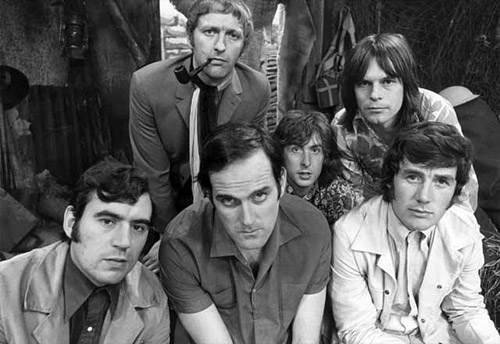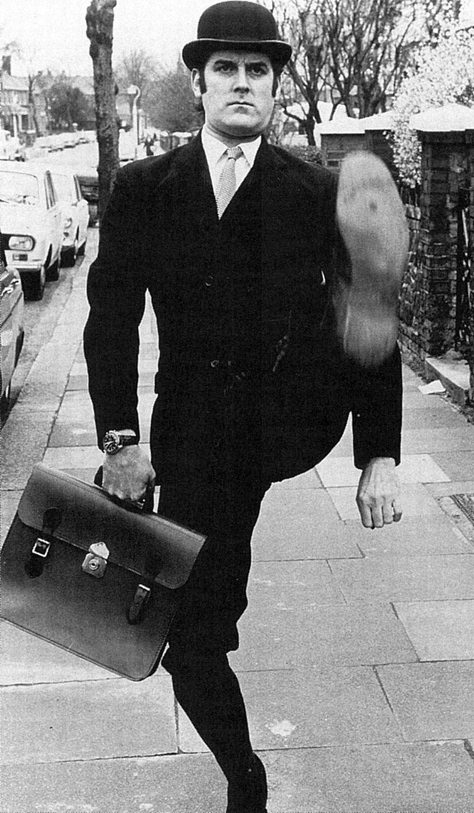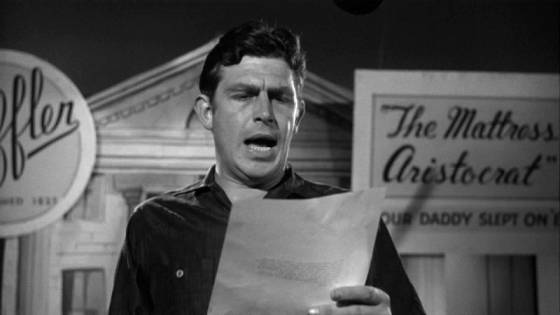For fans of NBC sitcoms, the return of Community is surely the week’s big news — but thanks to a packed DVR and a baby pushing the boundaries of his bedtime following a daylight-savings shakeup, I haven’t yet watched it. Instead, another and somewhat lesser show caught me by happy surprise. Whitney, still in its first season, featured an episode in which one of the side characters comes out of the closet. Neal — played by Jack’s former assistant on the increasingly moribund 30 Rock — finds himself confusedly but unerringly attracted to another man, and as the news travels around his circle of friends, I braced for stupidity, or worse, a conservative return to the status quo by story’s end. But none of this happened; Neal was allowed his realization, and his pals, usually a reliable generator of quippy sarcasm, took the announcement in stride. Not the most earth-shaking development, perhaps, but a victory nonetheless: a small bit of sanity and compassion amid an overheated political season and a television programming block otherwise prone to doofusy dismissals of difference and a disdain for the messiness of actual life. Bravo, Whitney, for doing something right.
Tag Archives: comedy
British Invasion

Ordinarily I’d start my post with a by-now-boilerplate apology for lagging behind the news, but in this case I will leave aside the ritual lament (“I’m just so busy this semester!”) and instead make proud boast of my lateness, boldly owning up to the fact that, although it was forty years ago last week that Monty Python’s Flying Circus had its first broadcast, I’m just getting around to remarking on it today. Seems only (il)logical to do so, given that one of Python‘s most fundamental and lasting alterations to the cultural landscape in which I grew up was to validate the non sequitur as an acceptable conversational — and often behavioral — gambit.
Let me explain. For me and my friends in grade school, the early-to-mid-seventies were a logarithmically-increasing series of social revelations, sometimes depressingly gradual, other times bruisingly abrupt, that we were “weird.” Our weirdness went by several aliases. The labels bestowed by forgiving parents and teachers were things like “smart,” “bright,” “eccentric,” “unusual,” and “creative.” Whereas the ones that arrived not from above but laterally, hurled like snowballs in the schoolyard or graffitied in ball-point across our notebooks, were more brutally and colorfully direct, and thus of course more convincing: “freak,” “spaz,” and — for me in particular, since it vaguely rhymes with Rehak — “retard.”
I see now that almost all of these phrases had their grain of truth, their icy core, their scored ink-line. In our weirdness we were smart and unusual and creative; we were also undeniably freakish, and as our emotional gyroscopes whirled wildly in search of some stable configuration, we were, by turns, spastically overenthusiastic and retardedly slow to adapt. We were book and comic readers, TV watchers, play actors, cartoon artists, model builders, rock collectors. We were boys. We liked science fiction and fantasy. Our skills and deficits were misdistributed and extreme: vastly vocabularied but garbled by braces and retainers; carefully observant but blindered by thick glasses; handsome heroes in our hearts, chubby or skinny buffoons in person. Many of us were good at science and math, others at art and theater. None of us did particularly well on the athletic field, though we did provide workouts for the kids who chased us.
Me, I made model kits of monsters like the Mummy, the Wolfman, and the Creature from the Black Lagoon — all supplied by the great company Aurora, with the last mile from hobby store to home facilitated by my indulgent parents — painted them in garish and inappropriate colors, situated them behind cardboard drum kits and guitars on yarn neckstraps, and pretended they were a rock supergroup while blasting the Monkees and the Archies from my record player. (I am not making this up.)
I was also a media addict, even back then, and when Monty Python episodes began airing over our local PBS station, I was instantly and utterly devoted to it. Which is not to say I liked everything I saw — a nascent fan, I quickly began drawing distinctions between the unquestionably great, the merely good, the tolerably adequate, and the terminally lame paroles that constituted the show’s langue, learning connections between these variations in quality and the industrial microepochs that gave rise to them: early, middle, and late Python. I had my favorite bits (Terry Gilliam’s animations, anything ever done or said by John Cleese) and my “mehs” (Terry Gilliam’s acting and the episode devoted to hot-air ballooning). Although or because I was stranded somewhere in the long latency separating my phallic and genital stages, I found every mention of sex and every glimpse of boob a fascinating magma of hypothetical desire and unearned shame. And, of course, it was all hysterically, tear-squirting, stomach-cramp-inducing funny.
The downside of Monty Python‘s funniness was the same as its upside: it gave all of us weirdos a shared social circuit. The show’s peculiar and specific argot of slapstick and trangression, dada and doo-doo, spread overnight to recess and classroom, connecting by a kind of dedicated party line any schlub who could memorize and repeat lines and skits from the show. In short, Monty Python colonized us, or more accurately it lit up like a discursive barium trace the preexisting nerd colony that theretofore had hidden underground in a nervous relay of quick glances, buried smiles, and raised eyebrows. Suddenly outed by a humor system from across the sea, we pint-sized Python fans stood revealed as a brotherhood of nudge-nudge-wink-wink, a schoolyard samizdat.
A good thing, but also a bad thing. The New York Times gets it exactly wrong when describing the “couple of guys in your dorm (usually physics majors, for some reason, and otherwise not known for their wit) who could recite every sketch”; according to Ben Brantley, “They could be pretty funny, those guys, especially if you hadn’t seen the real thing.” Nope — people who recite every Monty Python sketch are by definition not funny, or rather are funny only within an extremely bounded circle of folks who (A) already know the jokes and (B) accept said recitation as legal tender in their subcultural social capital. In my experience, there was no surer date-killer, no quicker way to get people to edge away from you at parties than by launching into such bonafide gems of genius as the Cheese Shoppe or the Argument Clinic. Yet we went on tagging each other as geek untouchables, comedy as contagion, as helpless before Pythonism’s viral spread as we would be, a few years on, by the replicating errata of Middle Earth and the United Federation of Planets.
Monty Python was merely the first infusion of obsessive-compulsive nerd scholarship into which I and my friends were forced by a series of cultural imports from Britain: grand stuff like The Fall and Rise of Reginald Perrin, The Hitchhiker’s Guide to the Galaxy, Alan Moore, and the computer game Elite. The three movies I like to name as my favorites of all time each have substantial UK components: Star Wars (1977) was filmed partly at Elstree Studios, Superman (1978) at Pinewood and Shepperton Studios, and Alien (1979), with Ridley Scott at the helm, at Shepperton and Bray Studios. And the trend continues right to present day: my favorite band is Genesis, I can’t get enough of Robbie Coltrane’s Cracker, and the science-fiction masterpiece of the summer was not District 9 (which gets high marks nevertheless) but the superb Children of Earth.
I sometimes wonder what to call this collection of British art and entertainment, this odd cultural constellation that seems to obey no organizing principle except its origins in England and its relevance to my development. How do you draw a boundary around a miscellany of so much that is good and essential about imaginary lives and their real social extrusions? Maybe I’m seeking a word like supergenre or metagenre, but those seem too big; try idiogenre, some way of systematizing a group of texts whose common element is their locus in a particular, historically-shaped subjectivity (my own) that is simultaneously a shared condition. The comic tragedy of the nerd, a figure both stranded on the social periphery yet crowded by his peers, lonely yet overfriended, renegade frontiersman and communal sheep, a silly-walking man with an entire Ministry of Silly Walks looming behind him.
I blame, and thank, England.

One Nation Under Stephen
I felt a delicious chill as I read the news that Stephen Colbert is running for President. (He made his announcement on Tuesday’s edition of The Colbert Report, the half-hour news and interview program he hosts on Comedy Central.) Why a chill? For all that I enjoy and respect Colbert, he has always prompted in me a faint feeling of vertigo. Watching his comedy is like staring into a deep well or over the side of a tall building: you get the itchy feeling in your legs of wanting to jump, to give yourself up to gravity and the abyss, obliterating yourself and all that you hold dear. Colbert’s impersonation of a rabidly right-wing, plummily egotistical media pundit is so polished and impenetrable that it stops being a joke and moves into more uncannily undecidable territory: simulation, automaton, a doll that has come to life. Unlike Jon Stewart on The Daily Show, Colbert’s satire doesn’t have a target, but becomes the target, triggering a collapse of categories, an implosion, a joke that eats itself and leaves its audience less thrilled than simply unsure (cf. Colbert’s performance at the 2006 White House Correspondents Dinner, at which he mapped uneasy smiles and half-frowns across a roomful of Republican faces).
Judging from Colbert’s offstage discussion of his work, like his recent interview with Terry Gross of Fresh Air, he’s a modest, sensible, reflective guy, able to view his Report persona with wit and detachment even as he delights in using it to generate ever more extreme, Dada-like interventions in popular and political culture — his Wikipedia mischief being only one instance. My half-serious worry is that with his latest move, he’s unleashed something far bigger than he knows or can control. The decision to place himself on the 2008 Presidential ballot, even if only in South Carolina, has been received by the mainstream media primarily as another ironic turn of the comedy-imitates-reality-imitates-art cycle, noting the echo of Robin Williams’s Man of the Year (2006) and comedian Pat Paulsen’s bid for the White House in 1968. But I think the more accurate and alarming comparison might be Larry “Lonesome” Rhodes, the character played by Andy Griffith in Elia Kazan’s A Face in the Crowd (1957). In that film, Rhodes goes from being a bumpkinish caricature on a television variety show to a populist demagogue, drunk on his own power and finally revealed as a hollow shell, a moral vacuum. The unsubtle message of Kazan’s film is that TV’s pervasive influence makes it a tool for our most destructive collective tendencies — a nation of viewers whose appetite for entertainment leads them to eagerly embrace fascism.
I’d be lying — or at least being flippant — if I claimed to believe that Colbert could be another “Lonesome” Rhodes. I’m neither that cynical about our culture nor that paranoid about the power of media. But given that we live in an era when the opportunities for self-organizing social movements have multiplied profoundly through the agency of the internet, who is to say where Colbert’s campaign comedy will mutate smoothly into something more genuine? Maybe he is, at this moment in history, the perfect protest candidate, smoother and more telegenic than Nader and Perot by orders of magnitude. He just might win South Carolina. And if that happens … what next?


